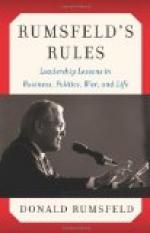But unless there is a thorough change as soon as possible, unless steps are taken to find a man competent in the management of war and to give him a place in the Cabinet, where he can keep the naval and military preparations abreast of the policy, or check, a policy for the execution of which adequate preparation cannot be made, what guarantee can the Nation have that it will not shortly have a second war on its hands, or that the war now begun will be brought to a successful end?
But if war as a branch of the Nation’s affairs ought to be entrusted to a man competent in that branch, what about the tradition that any politician of eminence in the party is fit to be the Cabinet Minister at the head of any branch of the public service? Is it not the truth that this tradition is bad and should be got rid of, and that every branch of the Nation’s business has suffered from the practice of giving authority for its direction to a minister who has not been trained to understand it? The war will have been a great benefit if it leads to the universal recognition of the plain fact that Jack of all trades is master of none, and that no branch of the public service can possibly be well directed unless its director is thoroughly conversant with the business with which he is entrusted. So soon as the Nation grasps the idea that democracy can fulfil its mission only when the electors are resolved to choose leaders by their qualification for the work they have to do, the British Nation will resume the lead among the nations of the world.




